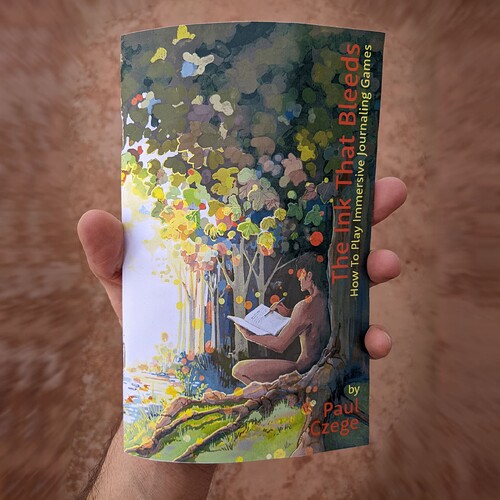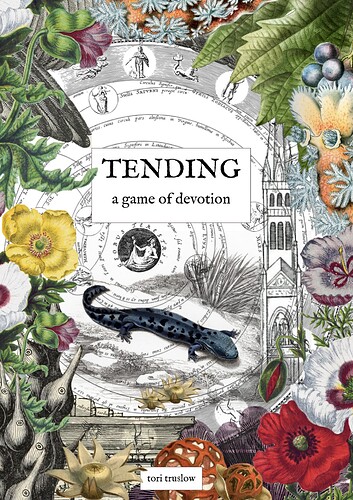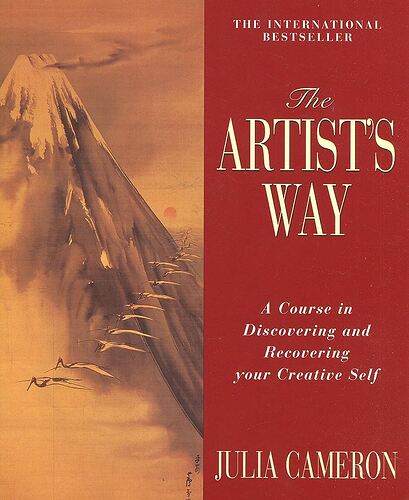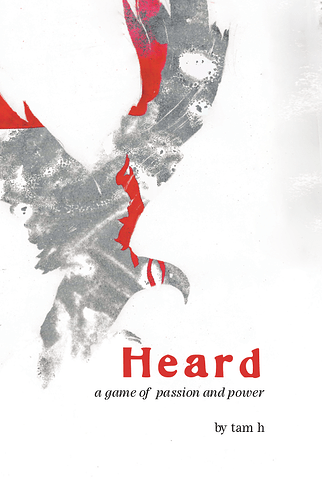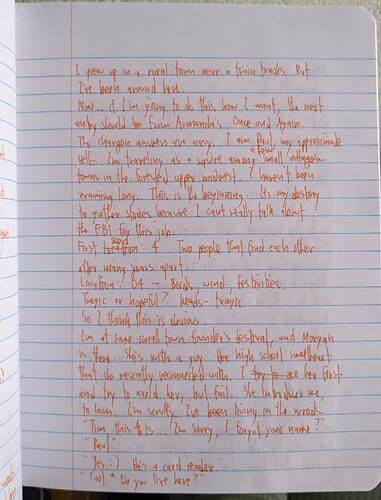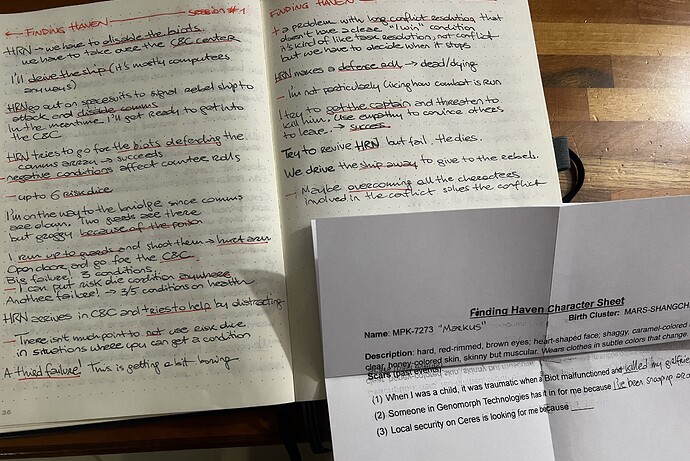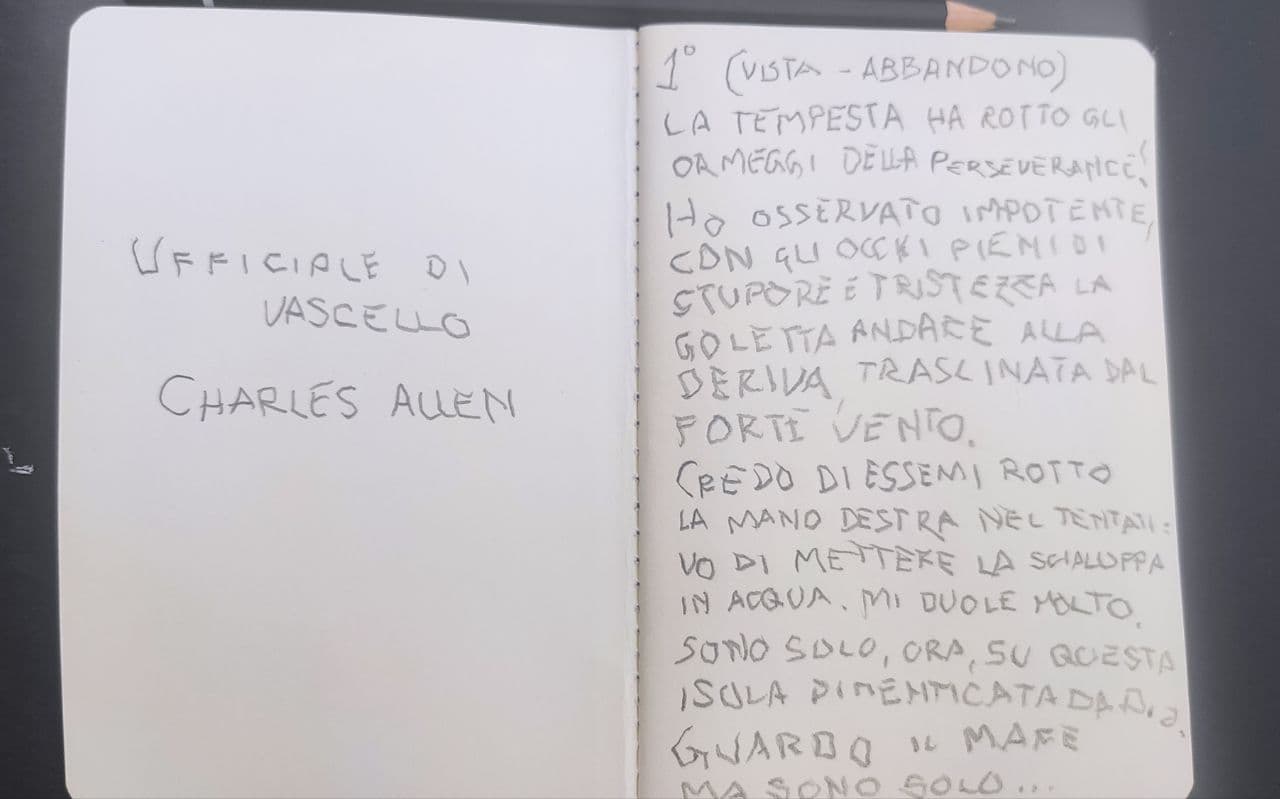I’ve been wanting to write about journaling games. I’m very consumed by them. I just don’t know where to start. I wrote The Ink That Bleeds about them, and now if I post something from my recent play, and what I realized from it, and you haven’t read The Ink That Bleeds, maybe it doesn’t make any sense?
So…this is an experiment.
I write about your approximate self in The Ink That Bleeds. It’s playing immersive journaling games as basically yourself, just affected as you’ve been by prior games and with any necessary changes for the situation in the current game. So you know how to play guitar, or talk with spirits, or whatever is requisite for your new game, but then in all other ways you’re the persistent self you’ve been playing. For It Is Written, by Cat McDonald, I was a cartomancer at a summer beach event. Later when I played Once and Again, by Armanda Haller, I still had and used the oracle deck from It Is Written, but in both games I was also altogether the same person you’re reading right now.
It’s super fun.
Lately I’ve been thinking I might need to write a sequel to The Ink That Bleeds though. I’m realizing from my recent play that there are things to be said about the worlding you do when you play as your persistent approximate self from game to game, how you gain entry to the world of a game, or fail sometimes, and about the porousness between worlds, between the temporal world of your real life, and the worlds of your play.
A couple of months ago I started playing Tending, by Tori Truslow. I was really excited about it. I’ve always been drawn to monasteries and faith communities. I went to see the Dead Sea Scrolls when they were in Michigan, and bought the exhibit book about the Qumran community. I chose the desert saints setting seed/source by Alex MacFarlane from the Kickstarter bonus book of additional ones, and wrote to find out that they’re in the mountains above a valley in Arizona that’s mostly a sprawling private prison and its surrounding town.
Write to find out is a way of playing journaling games which aids immersion that I describe in The Ink That Bleeds. It’s based on Julia Cameron’s journaling practice that she describes in The Artist’s Way, which is like communication with your unconscious mind. You can read about it in this excerpt at the Indie Game Reading Club blog if you want.
I wrote how the desert saints have a few partially completed geodesic canopies, one of which is over an open kitchen and a dozen or more tables. A practice of the desert saints is to cook for anyone who comes. I wrote how there was a news article I read that made me want to go to them. There was a quote in the article: “Why should it surprise you that this beautiful world would react to the institutionalized taking of freedom with a contrary outpouring of it? It only surprises you because you have been unfree your whole life.”
I wrote how I arrived with food I bought from a roadside stand: peaches, peppers, onions, lemons. A woman of the community greeted me and asked if she could cook for me. “What did you bring? May I cook for you?”
“Yes, thank you.” I showed her what I had, and asked, “Do you have sugar? I could make lemonade?”
“Sure,” she said. “Come on. My name’s Unguarded.”
“I’m Paul.”
The members of the community all had descriptive names they’re given when they join. I wrote how later she gave me my name. I wrote another entry about weaving replacement shade panels for the canopy with her from rushes to replace ones that were damaged. I wrote another one about dudes who came with a business proposal to make a nearby hot springs into a sort of ongoing Burning Man that the desert saints would run. And then I decided to quit playing the game. It just wasn’t clicking with me. It believes you find spiritual truth by completing tasks assigned to you, task after task after task. And I don’t believe that. I spent years of my life in corporate jobs being given tasks by idiots in leadership positions, being told the work was part of a smart plan, and it never was. The best work I’ve done in my life is work I chose for myself.
I’m consumed by playing journaling games, but sometimes I just don’t gain real entry to one or another and I quit it. I couldn’t figure out how to believe the spiritual truth of the world works the way Tending believes does.
After quitting Tending I started to play These Stars Will Guide Us Home. I wrote a couple of entries, and didn’t click with it either. Then I played Beneath the Wishing Tree. I finished it, but again, didn’t really click with it. I love that it uses tarot cards, but it uses them wrong for me. It uses them to tell me actions I take and how I solve problems. I don’t get that as a design choice. Other games I’ve played that use tarot cards to inspire situations and then I write how I address them were so immersive, but not ones that use the cards to tell me what I do.
Then I playtested a short game called Temperance that I’m going to include as an extra on the back of a tarot card with the next one I do as a zine.
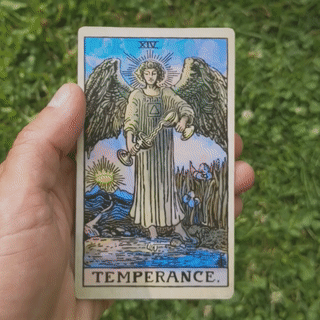
And then I started playing Tam H.'s game Heard. I wrote how I met a woman named Lindsley at a local park while I was sitting writing in my journal on a hill among some large rocks, which were a portal to another world that Lindsley emerged within. We talked about our experiences in other worlds and she asked if I wanted to go with her to hers. I played from this starting point through to the end of Heard over the course of six weeks. I was saved from an attacking wizard by a fairy who’d been watching over me. I shopped a goblin market with my friend Elise.
Heard is a pretty good game…though there’s a thing I don’t love about it. The moves you can do to resolve a situation aren’t the ways I resolve situations: fight, manipulate, seize, suffer, reckoning. I try super hard to play games rules-as-written, but the way those moves tell me who I am as a character made it very hard. It wasn’t unlike Beneath the Wishing Tree telling me how I would solve its problems. Both games did keep me playing though.
And then at the end of Heard I was sitting with my friend Dee, waiting for Elise who’d gone off to do something, and Unguarded came into Dee’s body and told me how two men had joined the community of desert saints and become close to the leader Benjamin, and how she’d been suspicious and discovered that they were trying to steal the secret of body possession for their employer, Season Hold, the prison services company in the valley. Unguarded knew I’d be horrified of what Season Hold would do with that ability and asked me to help her stop them. I had rolled a “Someone you trust has hired a new advisor and is acting strangely. They confront you, raving about a dark future.” prompt, and had written to find out the situation with the two new men in the community. Yeah they weren’t quite “hired” and weren’t quite “advisors”, and it was Unguarded telling me about the dark future, not Benjamin who they’d become close to, but it felt in the spirit of the prompt.
And that’s the thing I’m thinking of writing about in a sequel to The Ink That Bleeds. I wrote in it about how your unconscious mind maintains your approximate self from game to game, keeping some elements that it wants and shedding others. When I played Once And Again I still had the oracle cards from when I played It Is Written. But it does it for the world you inhabit too when you’re playing as your approximate self, keeping elements from past games and from your life in the temporal world, and eschewing others. When I played Transmission For Them my unconscious brought in a woman from a photo I’d seen years before I’d ever played a journaling game and had long forgotten about. Dee and Elise are characters I met in prior games that are still my friends. Elise worked for Season Hold in another reality where they’d become a sprawling and problematic prison services business. Dee I wrote about meeting in The Ink That Bleeds. She came to the goblin market to defend me to the fae who were planning to judge and hold me to account for what happened to the one of them who fought the wizard that attacked me. And my unconscious just erased the events of my few turns of These Stars Will Guide Us Home like they never happened, and I thought it had probably erased the events of Tending too. I hadn’t even written an ending for either of those games. But then for my last entry of playing Heard it totally surprised me and brought Unguarded back.
RPG designers generally believe a game needs some combination of a gamemaster or randomization for its world to feel alive and to surprise players, but it’s not true. When you play a game with your unconscious mind making decisions it will surprise you again and again and again.
Have you been playing journaling games? Have you experienced the porousness of the world that I’m talking about? The reason I wrote The Ink That Bleeds is because I think immersive journal gaming is a different experience than people guess and I felt no one was writing about their play to show the actual experience. I’d love to see people writing about it here on Wynwerod.
